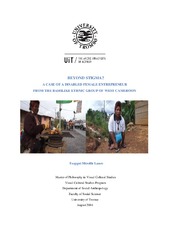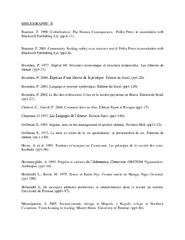| dc.contributor.advisor | Holtedahl, Lisbet | |
| dc.contributor.author | Tsopgni, Mireille Laure | |
| dc.date.accessioned | 2016-11-14T10:47:07Z | |
| dc.date.available | 2016-11-14T10:47:07Z | |
| dc.date.issued | 2016-08-15 | |
| dc.description.abstract | ABSTRACT
This work was carried out among the Bamileke in the Menoua Division in the West Region of Cameroon. It presents my main informant, Kenfack Tsopmo Cecile, a handicapped woman of 44 years who uses entrepreneurship as a means to break the social rejection that many people face because of their handicap.
Despite her handicap, Cecile is very active and present on various social arenas. She is engaged in many different entrepreneurial activities. Thanks to her lifestyle she is well integrated in her society and regarded by many people around her as a courageous and hard worker. However, in spite of her capacity to progress in business, Cecile still finds it difficult to be taken as spouse, because of her physical appearance. While working with Cecile I learned not only about her particular case, but also about many issues that she shares with other handicapped women in Bamilike society. Many handicapped women in the Menoua Division have common traits like their cultural background and their handicap condition. Their cultural background makes them capable of undertaking business. But marriage is generally a serious problem for handicapped women, because in Menoua community, there are people who consider woman’s physical appearance as the sole proof of her beauty. As a result of such opinions, handicapped women are widely excluded from the marriage social field. As victims of social exclusion, some of these handicapped women have established an association to support one another and fight for their rights. | en_US |
| dc.identifier.uri | https://hdl.handle.net/10037/9968 | |
| dc.language.iso | eng | en_US |
| dc.publisher | UiT Norges arktiske universitet | en_US |
| dc.publisher | UiT The Arctic University of Norway | en_US |
| dc.rights.accessRights | openAccess | en_US |
| dc.rights.holder | Copyright 2016 The Author(s) | |
| dc.rights.uri | https://creativecommons.org/licenses/by-nc-sa/3.0 | en_US |
| dc.rights | Attribution-NonCommercial-ShareAlike 3.0 Unported (CC BY-NC-SA 3.0) | en_US |
| dc.subject.courseID | SVF-3903 | |
| dc.subject | Social stigma | en_US |
| dc.subject | Disablity | en_US |
| dc.subject | Entrepreneurship | en_US |
| dc.subject | Bamileke | en_US |
| dc.subject | Bamilike | en_US |
| dc.subject | Cameroon | en_US |
| dc.subject | Gender | en_US |
| dc.subject | Woman | en_US |
| dc.subject | Women | en_US |
| dc.subject | Social anthropology | en_US |
| dc.subject | Visual anthropology | en_US |
| dc.subject | VDP::Samfunnsvitenskap: 200::Sosialantropologi: 250 | en_US |
| dc.subject | VDP::Samfunnsvitenskap: 200::Kvinne- og kjønnsstudier: 370 | en_US |
| dc.subject | VDP::Social science: 200::Social anthropology: 250 | en_US |
| dc.subject | VDP::Social science: 200::Women's and gender studies: 370 | en_US |
| dc.title | Beyond stigma? A case of a disabled female entrepreneur from the Bamilike ethnic group of West Cameroon | en_US |
| dc.type | Master thesis | en_US |
| dc.type | Mastergradsoppgave | en_US |


 English
English norsk
norsk




